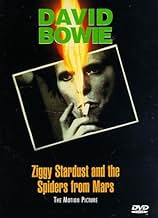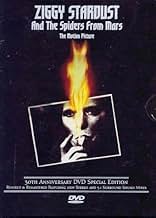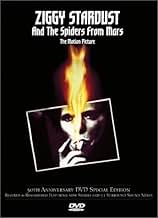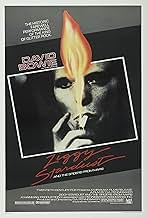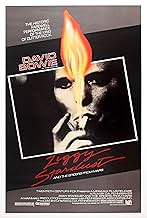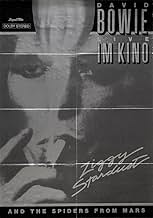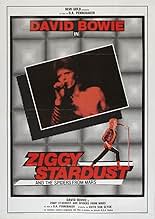IMDb RATING
7.5/10
3.1K
YOUR RATING
David Bowie performs as his alter ego Ziggy Stardust for the very last time at the Hammersmith Odeon, London on July 3, 1973.David Bowie performs as his alter ego Ziggy Stardust for the very last time at the Hammersmith Odeon, London on July 3, 1973.David Bowie performs as his alter ego Ziggy Stardust for the very last time at the Hammersmith Odeon, London on July 3, 1973.
Mick Woodmansey
- Self - Drums
- (as Mick Woodmansy, Woody Woodmansey)
Angie Bowie
- Self
- (uncredited)
Maureen Starkey
- Self
- (uncredited)
Ringo Starr
- Self
- (uncredited)
Featured reviews
Don't come expecting plot: Ziggy Stardust and the Spiders from Mars is just a concert film, recorded at the last show of David Bowie's "Ziggy Stardust" tour at the Hammersmith Odeon in London, July 3rd, 1973. However, to say it's _just_ a concert film doesn't quite cover the bases... Let's be blunt: if you like the idea of the 26-year-old Bowie in a skimpy satin tunic and boots, growling into a microphone and spreading his thighs for the fans, then you're going to love this film. If that idea does nothing for you -- and, frankly, if it doesn't then I think you're missing one of life's great kicks -- then you're not the target audience.
I should add that there are also five or six costume changes, some amusing backstage conversation, plenty of shots of the audience (apparently mostly fourteen-year-old girls in varying states of sexual ecstasy), and some rather scorching extended solos from lead guitarist Mick Ronson. Oh, yes: and I shouldn't forget to mention that Bowie's showmanship is amazing and the musical performances range from interesting to excellent -- there's a truly fabulous version of "Cracked Actor," for instance, with Bowie maintaining a surprising level of fierceness while playing harmonica and draped in a satin kimono.
Beyond the music -- "Ziggy" staples like "Changes," "Space Oddity," "My Death," "All The Young Dudes," etc., as well as covers of the Rolling Stones' "Let's Spend The Night Together" and Lou Reed's "White Light, White Heat" -- the visual imagery is what really makes this interesting. The come-hither hip-shaking of "Moonage Daydream," or the guitar-sex-flavored performance of "Time" (with Bowie in unitard, garter and feather boa), all make this a fantastic education in what Bowie's original aesthetic -- and sex appeal -- were all about.
Personally, I think this is a _Gesamtkunstwerk_ -- that is, a total work of art -- and should probably be beamed into outer space for the aliens to have fun with. But you can probably figure out which segment of the audience I fall into.
P.S.: By the by, Todd Haynes' Velvet Goldmine made a hell of a lot more sense after I'd seen this film.
I should add that there are also five or six costume changes, some amusing backstage conversation, plenty of shots of the audience (apparently mostly fourteen-year-old girls in varying states of sexual ecstasy), and some rather scorching extended solos from lead guitarist Mick Ronson. Oh, yes: and I shouldn't forget to mention that Bowie's showmanship is amazing and the musical performances range from interesting to excellent -- there's a truly fabulous version of "Cracked Actor," for instance, with Bowie maintaining a surprising level of fierceness while playing harmonica and draped in a satin kimono.
Beyond the music -- "Ziggy" staples like "Changes," "Space Oddity," "My Death," "All The Young Dudes," etc., as well as covers of the Rolling Stones' "Let's Spend The Night Together" and Lou Reed's "White Light, White Heat" -- the visual imagery is what really makes this interesting. The come-hither hip-shaking of "Moonage Daydream," or the guitar-sex-flavored performance of "Time" (with Bowie in unitard, garter and feather boa), all make this a fantastic education in what Bowie's original aesthetic -- and sex appeal -- were all about.
Personally, I think this is a _Gesamtkunstwerk_ -- that is, a total work of art -- and should probably be beamed into outer space for the aliens to have fun with. But you can probably figure out which segment of the audience I fall into.
P.S.: By the by, Todd Haynes' Velvet Goldmine made a hell of a lot more sense after I'd seen this film.
Bowie is clearly enjoying himself here, although today he claims to find this record of the Spiders final show unwatchable. The costuming IS spectacularly dated and Ziggy's antics do more to camp up a storm than forewarn of an imminent apocalypse. Aside from the music though, there is more going on here than silly, decadent posturing. Backstage musings by Bowie are suggestive of why he is not merely a relic from a past era: there is inherent tension between the public persona and the demand to discover the "real" Bowie. Rock music has since split into 2 positions along these lines: for the most part, the English traditions of camp and irony have served as a distancing device from the demands of an "authentic" self which can impose on others in an intrusive way- Jewel's folk music/"Knight Without Armor" is merely the latest manifestation of the latter tendency (also, despite the hatred of hippies, Nirvana ironically shared their "no hang ups" philosophy in their "Come As You Are" period). Ziggy was, at the time, the most extreme movement away from the "authenticity" of Woodstock Nation in which there was nothing separating the performer and the audience...been an "alien being" also guaranteed a spectacular show for record buyers who may otherwise have had little interest in live music given the high fidelity improvements in recording technology and home sound systems which were starting to become available. It is the irresolvable tension between these two tendencies toward camp/authentic which helps generate the excitement of the audience captured in this film, and which can still inspire interest and enjoyment today.
I have absolutely no idea what movie the vast majority of commenters were watching... For a start, Pennebaker's style of documentary is grainy and gritty through *choice* not "amateurism". It's called REALISM. I first saw "Ziggy" in a movie theatre in Germany and was completely blown away by its energy and freshness. I think it's a sad state of affairs that modern audiences are so dulled by CGI and DVD extras, that they can't appreciate a mind-blowing piece of cinema verite like this. This movie captures all of the sweat, hysteria and sheer balls of Bowie's final performance as Ziggy Stardust, and it's incredible.
To look at Ziggy Stardust and the Spiders from Mars and be much too critical of it, and this is now four months since David Bowie left his corporeal form (has it been that long already?) is difficult. I know I can certainly nitpick certain things, mostly in the streak of the 'auteur'; given that this is DA Pennebaker, who also brought us basically the definitive Dylan doc from the era a decade before this, Don't Look Back, and the precursor to Woodstock in Monterey Pop, this isn't quite as superlative as those films as far as the Cinema Verite fly-on-the-wall approach. There's some behind the scenes stuff, but it's not terribly involving (aside from seeing Bowie's make-up put on to make him Ziggy) as the conversations seem muted and uninteresting (yes, even with Ringo backstage which seems a feat).
BUT, and this is the big but here, I know deep down I don't care, at least as far as why I wanted to watch this again. And somehow, of all things, watching his life performance here of 'Space Oddity' finally made me cry. I don't know whether it would've brought me to tears (not for too long, just enough, and some of it was due to feeling a connection with the audience as a couple of people shown by Pennebaker's camera were also in tears), but it was in that moment it hit me: we won't get this again, not quite in this style, not quite in this style, not shot on such rough film and in such an atmosphere.
Of course there are still provocateurs in rock/pop (Marilyn Manson on the heavier side, Lady Gaga on the more space-driven and sexual, if it can somehow get more sexual than Bowie), but Bowie was his own sound much as Tarantino was and is his own filmmaker: taking from various sources (rock, blues, glam from T-Rex, the avant-garde rock of Lou Reed, Iggy Pop to an extent) and making it his own giant and unmistakbale SOUND in full caps. And don't forget this is David Bowie as Ziggy friggin Stardust and the Spiders from Mars - including the practically incomparable guitarist Mick Ronson on guitar playing like he's ten years ahead of the fashion and heavy metal stars only still in his own class - and playing off of all the works he'd done up through the masterpiece Aladdin Sane.
Here you get to see him perform many of his big hits (along with Oddity you get 'Changes' and 'Suffragette City' and his own rendition of 'All the Young Dudes' which he wrote), and Pennebaker and his crew are at times breathless to keep up and yet have enough cameras and sense to also get the crowd. The audience is a key part of this, even as at times it's hard to see all of them and the lights make it into its own stylized piece of filmmaking; they're often seen only briefly, and yet what we see is enough and, again, I think this helps to connect the audience watching the film further with the band. But for all the hits (and some covers, like 'White Light White Heat' and 'Let's Spend the Night Together'), the stand-outs here are the songs that people who only know Bowie from classic rock radio won't know as well.
By the time that Bowie and the Spiders get to 'Time', which is more indebted to German lounge singing of the early 20th century (Threepenny Opera anyone?), the softer but incredibly incisive 'My Death', and a wild, possibly overlong but who the hell cares rendition of his most metal-ish song 'The Width of a Circle', he's on fire as a performer and totally in control of how he can command a stage and an audience. In other words it may not be the perfect rock documentary, hence why it's not the full top-star rating. But as far as performances by mega-stars in their prime, this is a keeper (and ironic that this was his "final" performance, of course just the beginning of the many many Bowies). And yet the tears I had briefly watching this and coming to grips after months of feeling numb to his loss were I think the fact that he'd still be iconic if all he left was this.
BUT, and this is the big but here, I know deep down I don't care, at least as far as why I wanted to watch this again. And somehow, of all things, watching his life performance here of 'Space Oddity' finally made me cry. I don't know whether it would've brought me to tears (not for too long, just enough, and some of it was due to feeling a connection with the audience as a couple of people shown by Pennebaker's camera were also in tears), but it was in that moment it hit me: we won't get this again, not quite in this style, not quite in this style, not shot on such rough film and in such an atmosphere.
Of course there are still provocateurs in rock/pop (Marilyn Manson on the heavier side, Lady Gaga on the more space-driven and sexual, if it can somehow get more sexual than Bowie), but Bowie was his own sound much as Tarantino was and is his own filmmaker: taking from various sources (rock, blues, glam from T-Rex, the avant-garde rock of Lou Reed, Iggy Pop to an extent) and making it his own giant and unmistakbale SOUND in full caps. And don't forget this is David Bowie as Ziggy friggin Stardust and the Spiders from Mars - including the practically incomparable guitarist Mick Ronson on guitar playing like he's ten years ahead of the fashion and heavy metal stars only still in his own class - and playing off of all the works he'd done up through the masterpiece Aladdin Sane.
Here you get to see him perform many of his big hits (along with Oddity you get 'Changes' and 'Suffragette City' and his own rendition of 'All the Young Dudes' which he wrote), and Pennebaker and his crew are at times breathless to keep up and yet have enough cameras and sense to also get the crowd. The audience is a key part of this, even as at times it's hard to see all of them and the lights make it into its own stylized piece of filmmaking; they're often seen only briefly, and yet what we see is enough and, again, I think this helps to connect the audience watching the film further with the band. But for all the hits (and some covers, like 'White Light White Heat' and 'Let's Spend the Night Together'), the stand-outs here are the songs that people who only know Bowie from classic rock radio won't know as well.
By the time that Bowie and the Spiders get to 'Time', which is more indebted to German lounge singing of the early 20th century (Threepenny Opera anyone?), the softer but incredibly incisive 'My Death', and a wild, possibly overlong but who the hell cares rendition of his most metal-ish song 'The Width of a Circle', he's on fire as a performer and totally in control of how he can command a stage and an audience. In other words it may not be the perfect rock documentary, hence why it's not the full top-star rating. But as far as performances by mega-stars in their prime, this is a keeper (and ironic that this was his "final" performance, of course just the beginning of the many many Bowies). And yet the tears I had briefly watching this and coming to grips after months of feeling numb to his loss were I think the fact that he'd still be iconic if all he left was this.
I just got back from seeing the restored version of Ziggy Stardust and the Spiders from Mars and I have to say I was pleasantly surprised. Though the concert film does have some shortcomings as mentioned in other reviews what it does have going for it is the music. The clarity of the music being played is extraordinarily clear and powerful. The band is tight and Mick Ronson plays his ass off. I never new he played so well. In addition, Jeff Beck makes a cameo appearance and plays two songs with the band. Jeff Beck plays a couple of cool solos as well. Though most of the focus is on David and Mick we get the full concert from beginning to end with a couple of backstage shots. If you are even a bit interested go see it. You won't be disappointed.
Did you know
- TriviaJeff Beck guested on guitar in two songs and was supposed to have been in the film, but asked not to appear in it because he felt his solos and his appearance, looking more like a '60s blues rocker than Bowie and the Spiders' theatrical outfits didn't quite fit the movie. His performances have been added to the film for its 50th anniversary re-release.
- Quotes
David Bowie: What do you know about make-up? You're Just a Girl.
- Alternate versionsThe 50th anniversary re-release has been restored in 4K picture and sound, and features two previously un-released songs featuring Jeff Beck in the encore (specifically "The Jean Genie" and "Round and Round").
- ConnectionsEdited into In Concert: Bowie '73 with the Spiders from Mars (1974)
- How long is Ziggy Stardust and the Spiders from Mars?Powered by Alexa
Details
- Release date
- Country of origin
- Language
- Also known as
- Bowie '73 with the Spiders from Mars
- Filming locations
- Hammersmith Odeon, Hammersmith, London, England, UK(concert venue)
- Production companies
- See more company credits at IMDbPro
Box office
- Gross US & Canada
- $162,547
- Opening weekend US & Canada
- $6,816
- Jul 14, 2002
- Gross worldwide
- $434,721
Contribute to this page
Suggest an edit or add missing content


